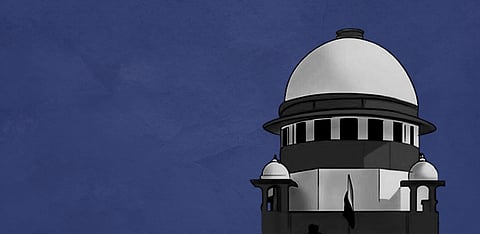

While affirming the Allahabad High Court order to remove the mosque from its premises, the Supreme Court bench also granted liberty to the petitioners to make a representation to the state government for an alternate piece of land.
—
The Supreme Court on Monday dismissed two petitions against the Allahabad High Court's 2017 judgment directing the removal of a mosque from the high court premises.
A bench comprising Justices M.R. Shah and C.T. Ravikumar observed that the petitioners had no right over the disputed land, adding that the land was required for a public purpose.
The bench granted three weeks' time to the petitioner to "remove" the mosque failing which the state authorities including the high court would be entitled to demolish the said mosque.
The bench also granted liberty to the petitioners to make a representation to the state government for an alternate piece of land. It added that on a request so made, the state may consider the same in accordance with law and on its own merits, taking into consideration if such lands are not required for any public purpose presently or in the future.
The bench was hearing two appeals filed by Waqf Masjid High Court and UP Sunni Central Waqf Board against the high court order.
The bench was of the view that the mosque was situated on government lease land which was cancelled in 2002.
The bench also took note of the Supreme Court's order of 2012 in which it had noted that clause 3 (C) of the lease deed gave absolute power that if the land was required by the state government for its own purpose or for any public purpose, it shall have right to give one month's notice to the lessees to remove any building standing on the demised premises and at the expiry of a two-month period, it shall take possession thereof.
Senior advocate Kapil Sibal, for the Waqf Masjid High Court, argued that the PIL on which the high court had passed the order was filed soon after the change in the state government.
"The government changed, and everything changed," he said.
Sibal added that the high court's reasoning that the free movement of the fire brigade needed an 11-meter of land setback ought to be applied to all the properties on the premises and not just the mosque. However, he submitted that he was not disputing the ownership of the land in question, but urged the court to give alternative land.
Senior advocate Indira Jaising, for UP Sunni Central Waqf Board, adopted the arguments made by Sibal. Jaising added that while the land belonged to the government, the waqf board was in possession of the mosque meant for public use. She added that the land had been dedicated to the waqf board.
Senior advocate Rakesh Dwivedi, for the high court, opposed the petitions and argued that there was no question of dedicating the land to the waqf board when the ownership of the disputed land vested in the state government. He accused the petitioners of playing fraud. He sought to argue that on a private lease land, one cannot create a waqf.
"Sometimes we see namaz on roads. That will not make the roads mosques," Dwivedi submitted.
Additional Solicitor General Aishwarya Bhati, for the UP government, supported the arguments made by Dwivedi.
In 2017, while directing the removal of the mosque, the high court had noted that it was facing an acute space crunch.
"The construction and completion of the 'administrative annexe' without further delay is a compelling necessity as of date as a number of offices/sections need to be shifted to this building to accommodate our judges in the main building and for meeting other necessities. Recently, 19 'additional judges' have been sworn in, but because of shortage of space, as many as 12 of them are sharing six chambers," the high court had said.
It had also directed its Registrar General to ensure that in future no part of the high court premises, either at Allahabad or at Lucknow, was permitted to be used for practising religion or offering prayers or to worship or to carry on any religious activity by any group of persons.